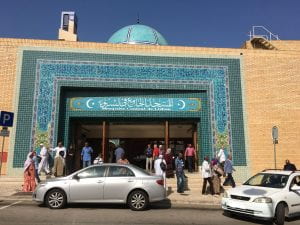by Michelle Johnson (anthropology, Bucknell University)
For decades, scholars have explored the dynamic between Islam and local cultures. When I began my fieldwork in Guinea-Bissau, I hoped to contribute to the debate. For Guinean Muslims, the fusion of ethnicity and Islam has long shaped their identity: to be Mandinga is to be Muslim, and Muslim identity is conferred through a mother’s milk, a father’s name, and participation in three rituals: name-giving, hand-writing, and circumcision.
But as Guineans encounter Muslims from outside of Africa and other ways being Muslim, they are beginning to differentiate these two identities. Being Muslim is not a matter of ethnicity, but rather a conscious choice or achievement, comprising Arabic literacy, belonging in the umma, and the five pillars of faith. This heightened consciousness has also inspired new ways of thinking about religion, more generally: religion looks not to a traditional past, but to an imagined future, full of possibilities. Debates about proper Muslim practice focused on rituals have intensified divisions between men and women, elders and youth, and those who emphasize belonging in the umma and those who remain rooted in African custom.
Guinea-Bissau’s 1998 civil war forced me to shift my dissertation fieldwork to Portugal, where I worked with Guinean Muslim immigrants living in and around Lisbon. This exciting shift led me to study religion and migration: whereas we knew much at the time about the relationship between Islam and local cultures on the continent, we knew considerably less about this dynamic in diaspora contexts, where the situation is more complex and the stakes, higher.
My recent book, Remaking Islam in African Portugal: Lisbon – Mecca – Bissau (Indiana University Press, 2020), is based on multi-sited, multitemporal fieldwork spanning two decades. In it, I argue that debates about African custom and global Islam focused on ritual practices have intensified in Lisbon as Guinean Muslims engage immigrants from Portugal’s other African colonies, Arab and South Asian Muslims, and as they experience increased racism and anti-Muslim sentiment. Is the writing-on-the-hand an obligatory rite that safeguards children against secularism, or is it an anti-Islamic one that should be abandoned?
Lisbon’s central mosque is the focal point of the city’s transnational Muslim community. For many Guinean Muslim men, frequenting the mosque highlights their inclusion in the umma. But their female counterparts often feel excluded from the mosque and in response have created “culture clubs,” in which they can celebrate life course rituals and Muslim holidays, fashioning an alternative model of cosmopolitan Islam. Mosques and culture clubs, however, are not mutually exclusive but rather mutually constitutive spaces within which (or against) Guinean Muslims move throughout their lives in Lisbon.
Being African and Muslim in Lisbon is fraught with ambiguities contradictions that extend beyond the usual traditionalist-reformist dichotomy. The orientations of African custom and global Islam appear more like points along a continuum, between which Guinean Muslims oscillate back and forth at certain times (or even in fleeting moments) as they remake themselves and their religion in a new locale and in changing world.
Join ISITA for a talk by Michelle Johnson (anthropology, Bucknell University), “Mosques, Culture Clubs, and Embodied Ritual Debates: Re-making Islam in a New African Diaspora,” on Wednesday, May 19 at 1pm. Register through Zoom before the talk.

